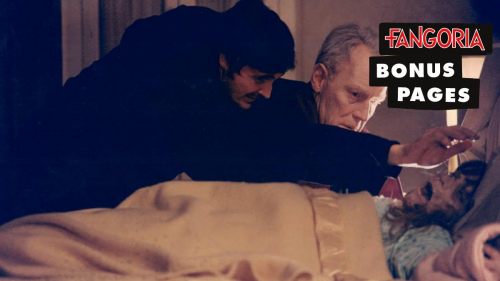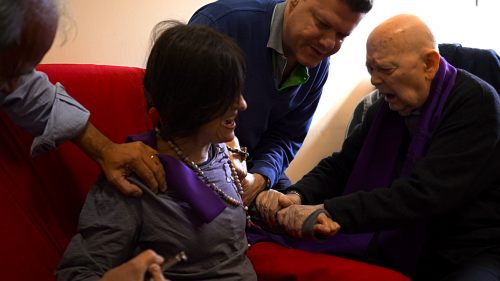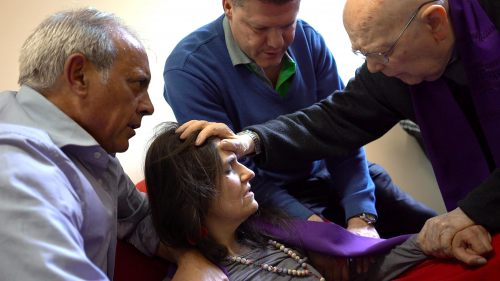SORCERER, The Movie That Got Blown Up By STAR WARS
Wiliam Friedkin blames Star Wars for the failure of Sorcerer. I’m not sure if he has a point in literal terms, although Sorcerer did come out right as Star Wars fever was gripping the nation, debuting a month after Luke first blew up the Death Star, but he’s certainly right in a larger sense. Star Wars heralded the end of the 70s Golden Age of film, and Sorcerer was the last movie of that wave to make it through, but when it was released it found the entire movie landscape had changed.
Maybe some of the problem came from the title; despite being called Sorcerer the movie has nothing to do with magic. Audiences could have been confused, thinking that the director of The Exorcist was back in the paranormal world and, seeing that it’s a movie about driving trucks in the jungle, been turned off.
But most of the problem, I think, came from the changing times. Friedkin’s movie is tough and smart, expertly crafted and thrillingly shot, but it doesn’t capture the feel-good matinee theatrics of Star Wars. After a decade of rough-edged movies about difficult men and existential crises, America had enough. Sure, Sorcerer is an adventure movie set in the jungle, but audiences wanted a lighter kind of adventure, and they’d happily visit the jungle with Indiana Jones in a few years, but they didn’t want to take this death trip with Roy Scheider.
It’s too bad because Sorcerer is damn good. A gorgeous restored DCP of the film is playing at the Cinefamily in Los Angeles all week before getting a Blu release and some further theatrical bookings, and this new print - vibrant, crisp and matched with the bone-shaking thrum of a deep, deep subwoofer rumble - shows just what a beautiful movie audiences missed out on in 1977. The film is based on the novel Wages of Fear by Georges Arnaud, but for Friedkin it’s really a (loose) remake of the 1953 movie by Henri-George Clouzot. The film is dedicated to the French master, and Friedkin went to him for his blessing before starting out.
Friedkin’s film is fundamentally different, perhaps no more obviously than in the opening. Sorcerer has a lengthy series of prologues establishing the four men who will end up as the main characters. They come from all over the world, and they are on the run. One is an assassin, another a Palestinian terrorist who just blew up a building in Jerusalem. One man is a French banker whose world has collapsed around him thanks to shady dealings. And one is Roy Scheider, a small-time hood whose latest robbery goes terribly, horribly wrong.
Scheider’s gang rips off a local parish, shooting a priest in the hold-up. This is already bad news, and sets up a need for redemption that the film - a trip through purgatory - might offer him, but what makes it worse is that the parish is under the protection of a big time mobster. And the priest is his brother. So Scheider hightails it out of the United States, fleeing with no money and ending up in a shithole jungle village in a South American banana republic. These four men all find themselves there, working demeaning jobs as laborers, barely getting by. Escaping their demons barely seems worth it as they sweat and work and find solace only in the arms of the rugged looking waitress at the bar run by a fugitive reichsmarschell.
But an opportunity arises. An American oil company has a disaster at a site 200 miles away; a massive explosion sets a producing well on fire and kills dozens. The company doesn’t care about the deaths, but Friedkin does; this movie is about the way life can end in an instant, and he spends time with the charred corpses and the grieving families. Sorcerer is a movie about four men who are from outside trying to get away from this place, but it’s also very concerned with the people who are stuck there, and is filled with shots of daily life and work and hints of the crushing political situation that allows American corporations to treat the locals like replaceable parts.
Anyway, that explosion means the well can’t produce and the company needs to get a certain number of barrels moving or else the whole operation will be shut down. A representative of the corporation comes up with a scheme - there are six boxes of nitroglycerin, and they must be transported 200 miles to blow up the well, capping the fire. The problem is that the nitro hasn’t been well tended and is now volatile; the smallest jolt could cause it to catastrophically explode. The only way to get the nitro to the well is to drive it over horrible, rough, barely delineated jungle and mountain roads. The plan: get two trucks, with two drivers each, and send them off. The company figures one of the trucks will make it. Hopefully.
The four men from the prologue become the drivers (with the assassin killing his way on to the team. Is he the hit man hired to off Scheider?) and the rest of the film follows them as they wind their way through muddy swamps and precarious roads and over bridges that barely exist. The action is these men against the world itself, always hyper-aware that there is an unpredictable payload that could, at any moment, explode and kill them.
It creates extraordinary tension. Scenes of the men simply lifting boxes into the back of the trucks leave you squirming in your seat, especially when set against a driving electronic score by Tangerine Dream. Friedkin has established the power of explosions twice in the film already, and each of them - the Jerusalem detonation and the well explosion - rip through quiet scenes. He’s let us know that explosions don’t happen with countdown timers, they happen when you’re just getting out of your car or are just walking through a worksite having a conversation. This is the existential terror at the heart of Sorcerer - your life could blow up at any fucking second.
Of course some seconds are more terrifying than others. The trucks make their way over these treacherous routes and Friedkin shoots close-ups of the tires slipping and of bridge planks snapping. The sound design in Sorcerer is impeccable; you hear the weight of the truck shifting a wooden slat, you feel the creak of the truck frame as it tries to negotiate a narrow road set a thousand feet up the side of a mountain. The film’s central set piece - two trucks making their way over a rotten, barely-there rope bridge over a rain-swollen river - is one of the most harrowing scenes in movie history and it’s mostly shots of trucks slowly inching forward.
Friedkin’s very use of editing is explosive; he has these two trucks to play with, and he’ll smash cut from a tense shot of one truck just barely making it over a potentially deadly bump to the other truck driving along. The sudden change of scene is as heart-stopping as a potential explosion. He masterfully builds and deflates tension, bringing the trucks to another insurmountable obstacle and making us watch - often in wide shots, sometimes in sweat-drenched close-ups - as the men must make their way forward. Just as we must make our way forward every single day, no matter what.
There’s not a lot of dialogue in Sorcerer. Much of it is functional at best. Roy Scheider is the star of the picture, but he has little to say. Haunted by the events of that robbery gone wrong - he’s the kind of hood who doesn’t even carry a gun - he’s a grim-faced worker. Gone is the amiable authority figure of Jaws, replaced by a man who is lost, possibly literally as he makes a decision at a fork in the road early in the drive. As the film goes on it becomes clear that Scheider’s character is perhaps not traveling through purgatory to redemption - he’s headed to a place where a hundred-foot tall flame bellows forth from the scorched earth. He’s on a road to hell.
And that becomes explicit in the landscape. This new DCP of Sorcerer presents the jungle in eye-smashing bright greens and reds, a wild, overgrown land that slowly becomes more barren as the trucks move towards their end destination. They eventually come to a weird, rocky landscape whose surreal formations match the exhausted, guilty hallucinations that beset Scheider. It’s amazing.
And then we come to the end. Spoilers here, for those who haven’t seen the film yet, and that’s probably a lot of you. But for those who have seen the film the ending is a vital piece of the puzzle, and one placed in a new light by Friedkin himself, who did a lengthy Q&A after a showing of the film this week.
Scheider is the only survivor of the convoy, having carried the nitro by hand the final two miles before collapsing in front of the flame, exhausted. Now he’s cleaned up and paid double wages and about to fly out of town. He’s having one last drink and a dance with that rough-looking waitress when a taxi pulls up outside. It’s two thugs from the United States, looking to repay Scheider for that prologue robbery and shooting. The camera cranes up as they walk into the cantina, out of sight. There’s silence. And then a gunshot - and credits.
The easy reading is that Scheider is killed here. It seems in line with the film’s entire thesis of life ending at any possible moment, and it reflects the ending of the original film (Yves Montand drives away from town, but recklessly, and drives off a mountainside). But Friedkin - perhaps mellowed by the almost forty years since he shot this film - put a new spin on it. Who says that Scheider dies? It’s a lady and the tiger situation; Scheider is a man who has made everybody happy. He’s saved the job of the company guys, who are in the bar. He’s saved the jobs of the townsfolk. And he’s danced with the waitress one last time. Who’s to say someone doesn’t throw themselves in front of that bullet, or that Carlos, the reichsmarshcall, doesn’t have a gun behind the bar he uses in the nick of time? Maybe it’s the thugs who take the bullet.
Well, except of course it isn’t. There are two trucks in the film, Lazaro - the truck Scheider drives - and Sorcerer. Sorcerer is the one that blows up, and it’s the truck that gives the film its title. A movie named after a doomed truck doesn’t let its hero walk out of that cantina alive. A movie with that title sticks to its nihilism right until the end. Sure Lazarus cheated death, but he eventually found his way back into that tomb.
Sorcerer is playing at the Cinefamily all week. I cannot recommend seeing this film on the big screen enough. Click here for tickets.



